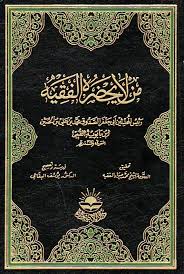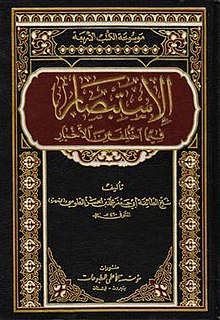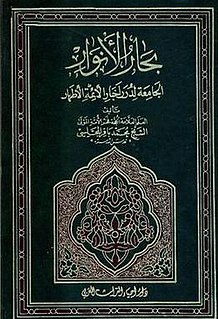
Bihar al-Anwar is a comprehensive collection of traditions (ahadith) compiled by Shia Muslim scholar Mohammad-Baqer Majlesi, known as Allama Majlisi. It is a hadith collection as the secondary source used beside the four books. Bihar al-Anwar which a compendium of Hadiths, historical subjects and commentaries on many Qur'anic verses,completed between 1106 AH and 1110 AH.
Abu Ja'far Muhammad ibn Ya'qub ibn Ishaq al-Kulayni al-Razi. was a Persian Shia hadith collector.

Abu 'Abd Allah Muhammad ibn Muhammad ibn al-Nu'man al-'Ukbari al-Baghdadi, known as al-Shaykh al-Mufid and Ibn al-Mu'allim, was a prominent Twelver Shia theologian. His father was a teacher (mu'allim), hence the name Ibn al-Mu'allim. The title "al-Mufid" was given to him either by Muhammad al-Mahdi, the twelfth Shia Imam, or by al-Rummani, a Sunni scholar, after a conversation with him. The leader of the Shia community, he was a Mutikallim, theologian, and Shia jurist.
Khadijah bint Khuwaylid, the first wife of the Islamic prophet Muhammad, had six children. Some Shi'ites dispute whether all of the children were born in her marriage to Muhammad, or if three of the four daughters were actually the daughters of Hala Bint Khuwaylid, her sister.

Reality of Certainty is a Shiite collection of hadiths authored by Muhammad Baqir Majlisi in the 16th century.
Shaykh Tusi, full name Abu Jafar Muhammad Ibn Hassan Tusi, known as Shaykh al-Taʾifah was a prominent Persian scholar of the Twelver school of Shia Islam. He became known as "Sheikh of the Sect ," authored two of the four main Shi'i books of hadith, Tahdhib al-Ahkam and al-Istibsar, and is believed to have founded the Najaf Hawza. He also counts as the founder of Shia jurisprudence.

Abu Ja'far Muhammad ibn 'Ali ibn Babawayh al-Qummi, commonly referred to as Ibn Babawayh or al-Shaykh al-Saduq was a Persian Shi'ite Islamic scholar whose work, entitled Man la yahduruhu al-Faqih, forms part of The Four Books of the Shi'ite Hadith collection.
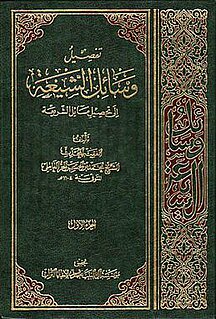
Wasā'il al-Shīʿa is a reputable book of hadith in Shia Islam, compiled in the 17th century by Shaikh al-Hur al-Aamili. Shaikh Al-Hur wrote two editions of this book, ahl al-bayt which is a 30 volume long edition of it, and Al-Islamiyyah which is 20 volumes long.

Tahdhib al-Ahkam(Tahdhib al-Ahkam fi Sharh al-Muqni'ah) is a Hadith collection, by Twelver Shia Hadith scholar Abu Ja'far Muhammad Ibn Hasan Tusi, commonly known as Shaykh Tusi. This work is included among the four books of Shia Islam. It is a commentary on the Al-Muqni'ah by Al-Shaykh Al-Mufid, who was a Twelver Shia theologian.

Uyūn akhbār al-Riḍā, counted as a Hadith book among Shiite, the book has written by Ibn Babawayh, one of the great Jurist and theologian of Shiites. The book concerned with saying and life of eight Shiite Imam Ali al-Ridha.

The Risalat al-Huquq is a work attributed to Ali ibn al-Husayn the fourth Imam of the Shia except for his relatively short sayings and letters. Risalah al-Huquq is narrated in Al-Khisal, Al-Amali, and Man la yahduruhu al-Faqih all by Shaykh al-Suduq and in Tuhaf al-Oqul by Hussayn ibn Shu'bah Harrani. This charter is narrated by Abu Hamza al-Thumali, a reliable and admired companion of Ali ibn al-Husayn for the first time. Risalah al-Huquq is prefaced in of the two versions by: "This is the treatise of Ali ibn al-Husayn to one of his companions", which shows to be written at the request of a pupil of him. Based on On 'Treatise of rights' that the word 'rights' is much better translated as duties, obligations or responsibilities.
Al Amali means "book of dictations". The Al-Amali of Shaykh Saduq is a hadith collection by al-Shaykh al-Saduq, the shia jurist and theologian. Amālī or Majāles, recorded his regular Tuesday and Friday sessions in Nīšāpūr in 367-68/978-79. These dictations consist of miscellaneous traditions, but mostly accounts of the virtues of the Imams. These include the virtues and moral character of the household of Muhammad and moral exhortations.

Hadith of Fatima tablet, also known as the Hadith of Lowh of Fatima is a tradition of Imam al-Sadiq who narrated his father Imam al-Baqir who in turn quoted Jabir ibn Abdullah as the original narrator of the hadith. This hadith specifically names twelve Imams as successors to Muhammad, prophet of Islam.
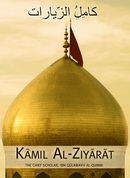
Kamil al-Ziyarat is a Hadith collection of 843 traditions, by the famous Twelver Shia Hadith scholar Abul-Gasem Jafar b. Mohammad b. Jafar b. Musab Qulawayh Qumi Bagdadi, commonly known as Ibn Qulawayh.
